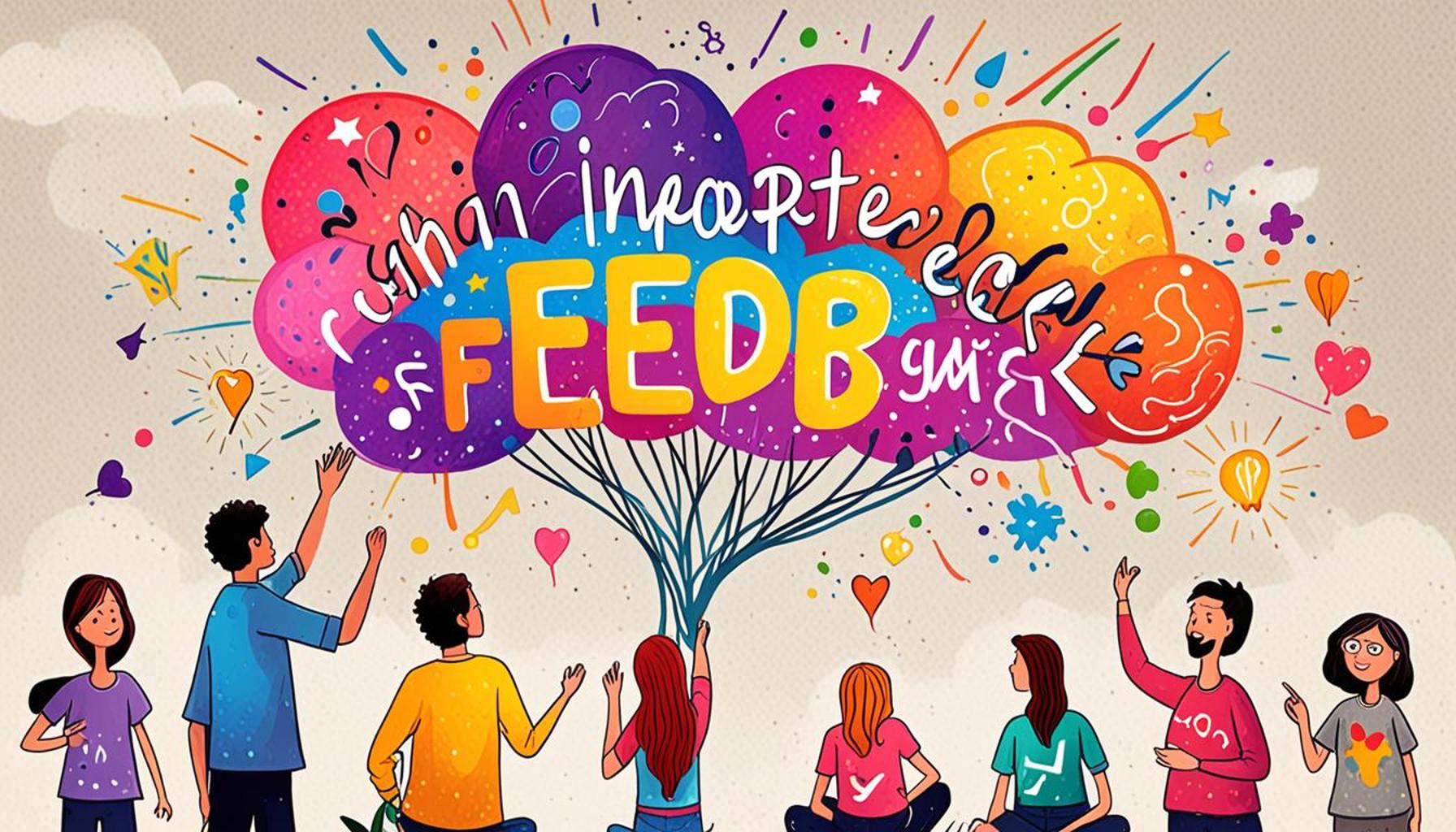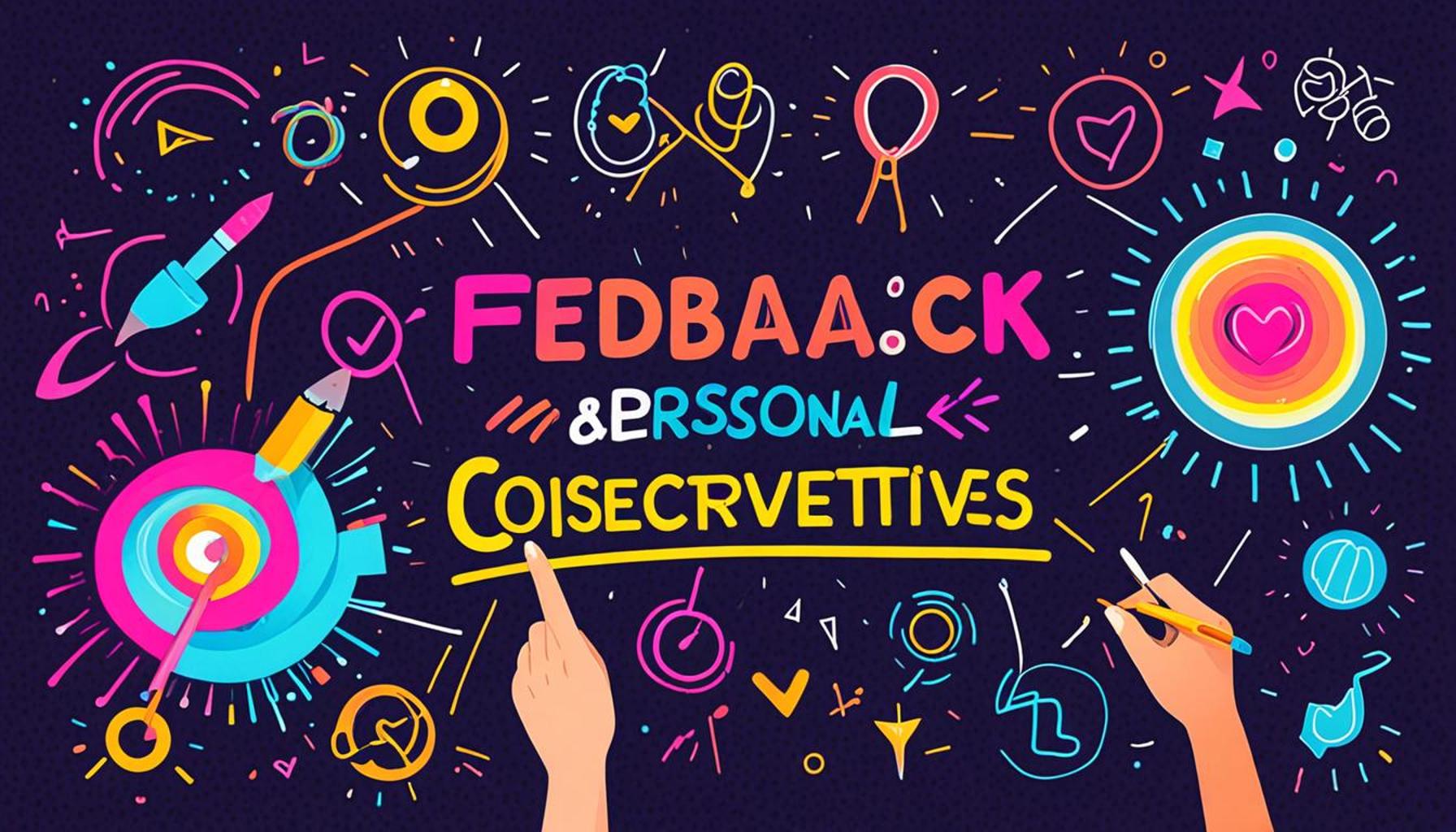The Importance of Peer Feedback: Fostering a Growth Mindset in Learning Communities

The Significance of Peer Feedback in Education
In today’s educational landscape, the role of peer feedback has become increasingly significant. It is not merely a tool for assessment, but rather a powerful mechanism for fostering a growth mindset among learners. This dynamic practice encourages students to engage in constructive interactions that enhance their skills and deepen their understanding of various subjects.
Benefits of Peer Feedback
When effectively implemented, peer feedback can lead to a multitude of benefits for learners:
- Encourage collaboration and communication: Peer feedback fosters an environment where students work together, share insights, and learn from each other’s experiences. For example, in a mathematics class, students may review each other’s problem-solving approaches, providing unique perspectives that help clarify concepts.
- Boost confidence in sharing ideas: Receiving feedback from peers can be less intimidating than from teachers, allowing students to express their thoughts more freely. This is particularly important in diverse classrooms in Nigeria, where students may come from varying educational backgrounds and levels of confidence.
- Promote critical thinking and self-reflection: Engaging with peer feedback encourages students to analyze their own work critically while considering the viewpoints of others. This dual process enhances their ability to reflect on their learning journey, as they evaluate not just the feedback received, but also how they can integrate it into future assignments.
The Context of Peer Feedback in Nigeria
In Nigeria, where educational methodologies are rapidly evolving, the incorporation of peer feedback has profound implications. From the bustling classrooms in Lagos to the serene towns in the North, creating a culture of feedback can equip students with essential skills required in today’s workforce. For instance, institutions like the University of Lagos have begun to implement peer review sessions in writing courses to cultivate critical thinking and collaborative writing skills among students.
Inclusive Learning Environments
Moreover, peer feedback plays a crucial role in promoting inclusive learning environments. It allows learners from diverse backgrounds to exchange ideas and perspectives, enhancing the educational experience. In Nigeria’s varied socio-cultural landscape, where students come from different ethnicities and regions, such diversity in input enriches discussions and fosters mutual respect.
Preparing for Future Challenges
As we explore the importance of peer feedback, it is evident that nurturing a growth mindset is vital for both individual and collective advancement. Engaging with peers not only aids in academic success but also prepares students to face challenges beyond the classroom. By instilling confidence, promoting open dialogue, and enhancing critical thinking skills, educational institutions can better equip students to navigate the ever-changing dynamics of life and work in today’s global society.

In summary, the implementation of peer feedback in educational settings is critical, particularly in a country like Nigeria, where development is ongoing. By valuing collaboration and encouraging diverse perspectives, we can ultimately build a stronger framework for education that benefits all learners.
RECOMMENDED: Check out this similar article
Harnessing Peer Feedback for Enhanced Learning
The integration of peer feedback into educational practices not only enriches the learning experience but also serves as a vital platform for students to cultivate a growth mindset. This mindset fosters a belief that abilities and intelligence can be developed through dedication and hard work, a pivotal notion within the context of modern education. By engaging in meaningful exchanges with peers, students begin to see challenges as opportunities for growth, leading to a more engaging and productive learning environment.
The Mechanics of Peer Feedback
Understanding how peer feedback operates is essential for appreciating its benefits. Oftentimes, feedback occurs through structured activities where students assess each other’s work, such as essays or projects. This method can take various forms, including:
- Structured Peer Review Sessions: In these sessions, students follow guidelines to evaluate specific components of their classmates’ work, such as thesis clarity, argument structure, and creativity. This not only ensures a focused approach but also helps students understand what constitutes quality work.
- Informal Discussions: Casual conversations among classmates about assignments allow for spontaneous insights and suggestions. For example, two students might discuss their approaches to a complex science problem, illuminating different but effective strategies.
- Digital Feedback Platforms: In the age of technology, online tools and platforms allow learners to provide and receive feedback asynchronously. Students can review each other’s assignments, adding comments and suggestions at their convenience, further enhancing the learning process.
The Cultivation of Confidence and Resilience
Participating in peer feedback not only develops essential academic skills but also plays a significant role in building students’ confidence and resilience. In classrooms across Nigeria, where educational disparities exist, having peers review work can reduce the anxiety associated with traditional forms of assessment. It allows students to share their thoughts openly, creating a safe space where they can learn from mistakes without the fear of harsh criticism.
Furthermore, this practice nurtures resilience as students learn to accept and process feedback constructively. Through peer evaluations, they begin to identify their strengths and weaknesses, which can catalyze personal growth and academic development. Such resilience is vital in the Nigerian educational context, where students are often faced with various socio-economic challenges that can affect their learning outcomes.
Encouraging a Culture of Lifelong Learning
Peer feedback is not merely an academic exercise; it is a foundational aspect of fostering a culture of lifelong learning. When students regularly engage in constructive dialogues about each other’s work, they develop skills that extend far beyond the classroom. They learn to articulate their thoughts effectively, accept diverse perspectives, and give and receive criticism in a balanced manner—skills that are paramount in the 21st-century workforce.
As we delve deeper into the significance of peer feedback, its ability to mold students into collaborative, reflective, and adaptive learners becomes undeniable. In the context of Nigeria’s burgeoning educational landscape, prioritizing peer feedback can be transformative, leading to enhanced academic performance and stronger, more resilient communities.
| Advantage | Description |
|---|---|
| Enhanced Learning | Peer feedback encourages critical thinking and reflection, essential components of a growth mindset. |
| Community Building | Fostering trust among learners, peer feedback creates a supportive learning community where individuals feel safe to share ideas. |
| Improved Performance | Consistent engagement with peer reviews leads to higher levels of academic achievement as students apply constructive feedback. |
| Diverse Perspectives | Receiving insights from multiple peers helps learners to broaden their understanding and enhance problem-solving skills. |
In academic settings, peer feedback is not merely an exercise; it serves as a catalyst for developing a growth mindset. Students, upon receiving constructive criticisms and insights from their classmates, begin to see their learning as a continuous journey rather than a destination. This shift not only enhances individual performance but also cultivates resilience in the face of challenges.Moreover, the act of giving feedback helps students articulate their thoughts and solidifies their own understanding of the material. Feedback sessions can reveal gaps in knowledge that might otherwise go unnoticed, allowing learners to address these areas proactively. Engaging in peer feedback can transform the classroom into a dynamic environment where collaboration and cooperative learning thrive, ultimately preparing students for real-world interactions. When students become accustomed to both giving and receiving peer feedback, they develop essential skills such as empathy, communication, and critical analysis. This not only enriches their educational experience but also equips them with essential life skills that go beyond the classroom. In light of these advantages, it becomes increasingly evident that fostering a culture of peer feedback is vital in shaping future-ready learners.
LEARN MORE: This related article may interest you
Transformative Impact on Learning Dynamics
Peer feedback has the potential to transform not only individual learning experiences but also the dynamics of entire learning communities. In a country like Nigeria, where collective learning can enhance educational outcomes, fostering a culture of peer engagement through feedback can significantly revolutionize how knowledge is shared and constructed among students. By leveraging the diverse perspectives within their educational environments, learners can gain insights that go beyond traditional rote learning methods.
Building Collaborative Relationships
One of the most profound impacts of peer feedback is the way it helps build collaborative relationships among students. When students participate in feedback sessions, they engage in a mutual learning process, which fosters trust and interdependence. Collaboration is particularly important in Nigerian classrooms, where group projects and teamwork are increasingly emphasized. For instance, when working on a science project, peers assessing each other’s contributions can spark discussion that leads to deeper understanding, creating not just stronger teams but also lifelong friendships and networks.
Moreover, this collaborative culture encourages students to view each other as resources rather than competitors. In local educational settings, where information is sometimes scarce, sharing insights openly can lead to richer discussions and innovative solutions. Structured group feedback assessments allow students to appreciate varying viewpoints, effectively nurturing empathy and cooperation.
Feedback as a Catalyst for Critical Thinking
Peer feedback functions as a catalyst for critical thinking, urging students to analyze their own work rigorously and consider different perspectives. Engaging with a peer’s work requires a level of scrutiny, prompting the reviewer to evaluate not only the content but also the methodology and underlying assumptions. Research indicates that students who provide constructive criticism often outperform their peers in analytical assessments due to heightened engagement with the subject matter.
In Nigeria’s educational context, where the curriculum increasingly blends theoretical knowledge with practical application, this critical thinking component can enhance students’ readiness for real-life challenges. For instance, discussions around business ideas in an entrepreneurship course can lead students to critically appraise market strategies or financial forecasts, deepening their overall understanding while honing valuable skills that are crucial in today’s economic landscape.
Impacts on Self-Regulation and Accountability
The cycle of giving and receiving feedback inherently promotes self-regulation and accountability among students. When students know their work will be scrutinized by peers, they are more likely to invest time and effort in producing higher-quality outputs. This intrinsic motivation is essential, particularly in contexts where external evaluation processes can be rigorous and stressful.
For Nigerian students, understanding that their peers will provide insightful feedback encourages a mindset where they take ownership of their learning journey. The responsibility of contributing to a peer’s education can lead to better organizational skills, time management, and dedication to academic integrity. This evolution not only prepares them academically but also instills values applicable in everyday interactions and professional environments.
Cultivating a Diverse Learning Environment
Peer feedback also influences the creation of a diverse learning environment that welcomes multiple viewpoints and ideas. In a multicultural nation like Nigeria, embracing diversity within learning communities can yield profound educational advantages. When students from varied backgrounds engage in feedback exchanges, they not only enrich each other’s learning experiences but also enhance cultural competency.
The awareness of differing experiences and perspectives can lead to innovative thinking and creative problem-solving, as students learn to appreciate solutions that may deviate from conventional approaches. This is particularly advantageous in disciplines such as literature and social studies, where understanding context can significantly impact interpretation and analysis.
YOU MAY ALSO LIKE: Read read another article
Conclusion: Embracing Peer Feedback for Holistic Growth
In summation, peer feedback emerges as a critical element in fostering a growth mindset within learning communities, particularly in dynamic educational landscapes like Nigeria. By encouraging students to engage constructively with one another, we open avenues for enhanced learning experiences that surpass conventional methodologies. The collaborative relationships nurtured through feedback mechanisms not only facilitate academic development but also empower students to build lasting networks and friendships, reinforcing the value of teamwork.
The reciprocal nature of peer feedback catalyzes critical thinking, sharpening students’ analytical skills and preparing them for real-world challenges. This process of reflection and exchange allows learners to take ownership of their education, nurturing a culture of accountability and self-regulation. Alongside these benefits, the diversity inherent in Nigerian classrooms enriches feedback interactions, cultivating a robust learning environment that celebrates varied perspectives and experiences.
Ultimately, embracing peer feedback as a fundamental part of educational practice not only enhances individual learning outcomes but also contributes to the creation of vibrant and inclusive learning communities. As educators and students alike navigate the complexities of today’s academic landscape, the importance of peer feedback cannot be overstated—it serves as both a bridge to deeper understanding and a catalyst for lifelong learning. Now is the time to integrate and prioritize these practices, ensuring that every learner is equipped with the skills necessary to thrive in a rapidly changing world.


